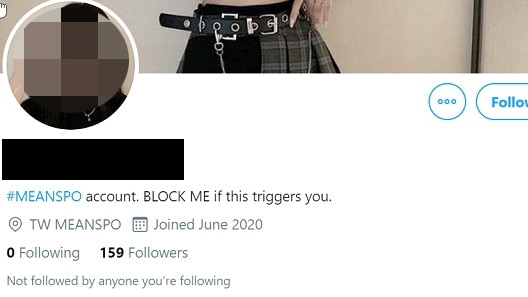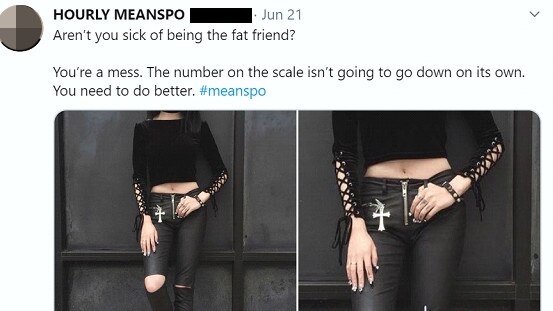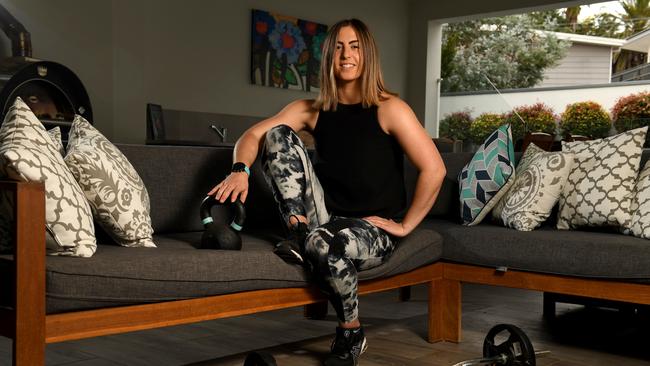Thinspo: Social media craze of ‘proana’ groups making Australia’s young women sick
Young women are being lured into a potentially deadly trap where “influencers” tell them how to starve themselves as they’re fat shamed and bullied. WARNING: Distressing content
Illness
Don't miss out on the headlines from Illness. Followed categories will be added to My News.
- ‘Thinspo’ underbelly: This shouldn’t be a TikTok ‘trophy’
- Eating disorders seen as 'rich, white girls' problem'
- Why TikTok is harming your child
Exclusive: Teenage girls and young women are being lured into potentially deadly online “communities” where they are fat shamed and bullied about their weight.
They are members of ‘proana’ groups – a disturbing mash-up of anorexia and bulimia – that are on every social media platform, with many having their own dedicated websites.
Some of the groups are disguised as “healthy eating” networks where young women encourage each other to lose weight by using ‘thinspo’ and stick thin images.
Others use ‘meanspo’ where members ask to be bullied using “fat insults” and taunts about weight and body size.
There are even proana “influencers” who offer themselves up as coaches using blogs and websites with “tips and tricks” and rules about how many calories you can ingest before you will be admitted as a member.
Those who end up in hospital severely malnourished are encouraged to share pictures of their feeding tubes or “trophy”.

On Instagram and Twitter you can follow eating disorder profiles or ‘coaches’, on Facebook there are public and private groups and the latest and more virulent platform TikTok has rapidly become a primary offender where people shoot videos from their hospital beds.
One website describes itself as being “proactive in anorexia – making the most of their lives despite their disorder” and says for some people it can be a “lifestyle not a disease”.
It also features a separate members’ only forum.
The Butterfly Foundation’s National Helpline clinician Amelia Trinick said the algorithm on social media platforms can be problematic as it drip-feeds the same kind of content.
She recommends having diverse feeds but also warns that social media platforms can be a bit like the “wild west.”
“Image-based social media, combined with the isolation brought on by the pandemic, has been the perfect storm for people to experience on such a constant basis the need to compare and criticise themselves,” Ms Trinick said.

“Social media can thrive on the fact that people don’t feel good about themselves and then they are more likely to buy products they think will make them feel better.
“Even something seemingly harmless like the fitspo movement is still having a negative effect.”
One Australian woman, who still struggles with eating disorders, told News Corp Australia it is “the only mental health disorder I know of where the sicker you are the more successful you are”.
“It is about being sick enough,” she said
“The online platforms fuel an eating disorder; Instagram and TikTok are so dangerous because if you like something that is eating disorder-related, then all of a sudden in your feed pops up girls in hospital or diet or fasting advice,” the woman said, describing the communities as “toxic and dangerous.”
“You see these people on TikTok with NG (feeding) tubes, almost glamorising it. They do it in a way that is fed by their own eating disorder, to validate their illness.”

Chelsea Marchetti, 20, was a dancer who struggled with an eating disorder and said she was always overlooked for roles or given the ‘boy part’ because she was considered bigger as a size 10.
As part of her recovery she has strictly filtered her social media and says the social media proana content makes it very difficult for anyone in the grip of an eating disorder to get better.
“I think it’s so destructive to girls who are in this position and haven’t come out the other side. It actually makes me really upset because, you know, it’s just fuelling what they’re doing. And it’s just so unhealthy. And it doesn’t give them any indication that what they’re doing is wrong.”

Change.org has had nearly 30 petitions calling on platforms to ban eating disorder content
American Olivia Wadford started her TikTok ‘ban proana content’ petition because of the insidious algorithm.
“I follow several eating disorder recovery accounts, which means that I often see content that is eating disorder-related. Due to this, I often come across videos that encourage viewers to engage in eating disorder behaviours,” the 21-year-old said.
Ms Wadford discovered the proana community at 13 and said they “encouraged people to engage in disordered eating behaviours.”

“I utilised ‘meanspo’ and ‘thinspo’ in order to hold myself accountable. Whenever I wanted to eat, I would look at pictures of really thin models, in hopes that one day I would look like one. Looking at pictures of thin girls motivated me even more, I was determined to get to my goal weight. I eventually reached my goal weight, and ended up losing forty more pounds.
“I am currently six months into recovery, and have a much healthier relationship with food. Looking back at my 13-year-old self, I had no idea how badly thinspo and meanspo would affect me, which is why I want to make sure that other young individuals who utilise TikTok are not being exposed to proana content.”
TikTok said it was committed to the wellbeing of its users and had engaged key non-profits.
“We care deeply about the wellness of our user community and are currently working with Butterfly on an in-app public service announcement (PSA) that offers support to those with eating or body image concerns and encourages the community to flag content that may be of concern,” a spokesperson said.
“The PSA will be surfaced if users search for certain related hashtags on the platform.
“Content that supports or encourages eating disorders is strictly against our Community Guidelines and will be removed. If we become aware of any content that violates our Terms of Service and Community Guidelines, we will take immediate action and terminate accounts as appropriate.
Personal trainers should be equipped with the skills to handle eating disorder issues as they are perfectly positioned on the fitness frontline.
But instead many may be oblivious to the body image issues their clients have and could be even making it worse.
Dr Sarah Maguire from Inside Out, the Institute for Eating Disorders, said many would be surprised to know how many clients have eating disorders.
“Gym and fitness professionals have a lead role to play,” she said.
“I don’t think they have been very well educated around mental illness in general and around eating disorders specifically.”
A ‘health halo’ around the fitness community can hide eating disorders and body image issues and Dr Maguire said: “I think they would be very surprised to learn that the type of work they are doing with that person could – if it’s not handled in the right way – lead to an increase in the severity of the presentation of mental illness.”
An Instagram spokesman said: “We have a deep responsibility to make sure the people on Instagram are safe, and content promoting or encouraging eating disorders is against our policies and will be removed.”
This content may be “triggering” for some people. Anyone needing support with eating disorders or body image issues is encouraged to contact the organisations listed below.
Butterfly National Helpline: 1800 33 4673 (1800 ED HOPE) or support@butterfly.org.au
Eating Disorders Victoria Helpline: 1300 550 23
For urgent support call Lifeline: 13 11 14
OPINION: HOW TO KEEP YOUR TEEN GIRLS SAFE ONLINE
Danni Rowlands is the Butterfly Foundation’s National Manager Prevention Services
The ongoing challenge that females face, regardless of age or where they are from, is that beauty and appearance ideals constantly change.
Society has always set the benchmark for what is ‘more’ beautiful or attractive when it comes to the female body, so this certainly is not a new thing for females to navigate.
The problem with ideals is that they don’t allow or celebrate difference, nor do they embrace diversity in body and appearance.
As a result of social media platforms, exposure to fit, thin beauty and appearance ideals is more saturated and intense than ever before.
Thin and fit body ideals are flooding newsfeeds, constantly changing, and reinforced by celebrities or influencers. Unfortunately, exposure to these images often drives feelings of inadequacy, ugliness, and unworthiness due to comparison, particularly in young, vulnerable teenage girls.

When a young person feels this way, they are more at risk of engaging in risky behaviours such as excessive exercise, dieting and cosmetic procedures in an attempt to improve the way they look, with the hope of changing the way they feel about their body and appearance.
Of course, this is never the long-term answer and instead places them at greater risk of experiencing ongoing body dissatisfaction, disordered eating and in some cases an eating disorder.
All of which can significantly impact their physical and mental health.
Parents can play a vital role in supporting their daughters to navigate social media in a positive way. Understanding the various platforms is a great place to start.
This will help parents to empower their daughters to choose what they see and follow and ultimately curate a more diverse, positive, and balanced ‘feed’.
It’s important that parents are aware of what their girls are posting, what hashtags they follow and who they are following. This may help to explain behaviours around eating, exercise, fashion, and beauty – particularly if these behaviours have recently changed.
Helping girls to challenge the messaging behind posts (sponsored and non-sponsored) is also vital as developing a critical eye when looking at social media images can help them see beyond the image; build their social media skills, change the internal narrative and strengthen their body confidence.
While it may be challenging at times to communicate with an adolescent, it is important to find ways to connect and to keep the lines of communication open. Honest, real, and non-judgemental conversations are key.
Complimenting your daughter, often, on their non-appearance based strengths, talents and attributes reaffirms that they are more than how they look – they are a whole person and you value them for who they are, not how they look. Showing them, through positive role modelling is also key.
If you are concerned that your daughter is overly preoccupied with health, weight, shape, appearance and if their mood, eating and exercise behaviours have changed.
We encourage you to trust your instincts and seek professional support at the Butterfly Foundation.
